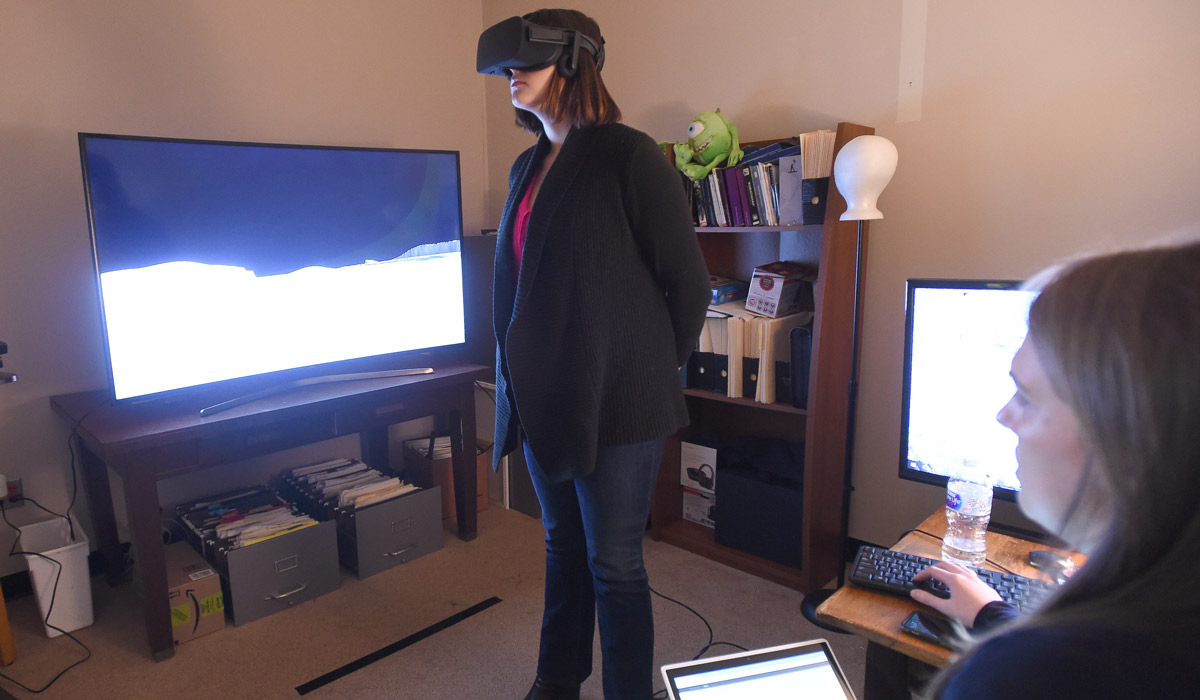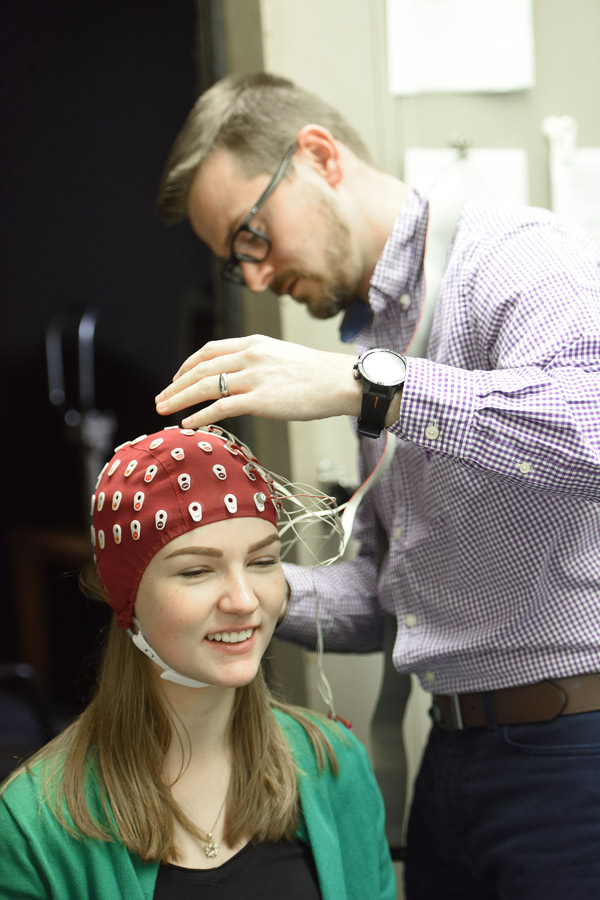

This spring, senior Madison Bell, a student in Catholic University’s Department of Psychology, presented a paper on her research at a professional association conference. Senior Erin Reckner and other undergraduates in the department gave talks on their own research studies at University Research Day. This emphasis on research experience is a hallmark of the undergraduate psychology program at Catholic University.
 Seth Kiser, is in charge of the psychology department’s electroencephalography lab. Here he works with a student to gather research data.
Seth Kiser, is in charge of the psychology department’s electroencephalography lab. Here he works with a student to gather research data.“We try to provide undergraduates with a small college experience within a research university,” says Marc Sebrechts, professor and chair of the program. “Our faculty take the time to mentor undergraduates who want to engage in research opportunities, and their level of personal involvement is high. The relationships are an asset as faculty write letters of recommendation for their students,” says Sebrechts.
Many undergraduates majoring in psychology are engaged in research through on-campus apprenticeships or off-campus internships at sites such as the National Institutes of Health and other prestigious research centers. “All candidates for the B.S. degree in Psychological and Brain Sciences complete a research apprenticeship in one of the department labs or internship off campus, and B.A. candidates have the option to do so,” says Marcie Goeke-Morey, associate professor and undergraduate program director. The labs span a wide range of interest areas, from cognition and virtual reality to suicide prevention.
Undergraduates perform a variety of tasks during a one-credit, four-to-five hour per week apprenticeship in a lab of their choice, including collecting, reviewing, and analyzing data. They assist with the research process firsthand, sometimes from start to finish, depending on how many semesters they participate in the apprenticeship. Each undergraduate works with a graduate student who serves as a mentor and supervisor.
“Getting into graduate school in psychology is a very competitive process,” Sebrechts says. “Right now, we have over 70 undergraduates participating in research apprenticeships or off-campus internships. The labs give our undergrads a solid advantage in terms of graduate school acceptance. The work they’re engaged in gives them experiences afforded only to graduate students at many other universities.”
Erin Reckner is learning a lot about marriage while she’s still a single 19-year old; she has a research apprenticeship in the Family Research Lab led by Goeke-Morey. Researchers in the lab are trying to understand more about how positive emotional communication between married couples impacts both marital quality and their children’s well-being. Reckner notes that “there’s a lot of information on how conflict and divorce affect a family, but not as much research on how positive interactions contribute to couple and family happiness.”
Reckner, like other undergraduates with research apprenticeships, has participated in many tasks that are the normal purview of graduate students and professors. She was on the team that developed a system for coding the interactions of 300 married couples talking about happy times in the marriage and family. Then came extensive training; she had to attain a specific level of reliability before coding couple interactions independently. She and others are now proceeding to code the interactions of the 300 couples.
The project whetted Reckner’s desire to prepare her own presentation for University Research Day — a voluntary undertaking. “Happy life: Tips for greater marital satisfaction explained by a single college student,” was the attention-catching title.
“Undergraduate research apprentices in our department regularly contribute to conference presentations, but it is less common for students to take the lead in developing and completing a conference presentation,” Goeke-Morey says.
There seems to be no upper limit to sophomore Dante Nicotera’s energy level. He serves as a Cardinal Ambassador, Orientation Advisor, executive board member on the Confirmation retreat team, president of Phi Eta Sigma Honor Society, and volunteer at Children’s National Medical Center, among other activities. All that happens when he takes a break from studying for his double major in Biology and Psychological and Brain Sciences. Dante is aiming for medical school and a sub-specialization in pediatrics.
Spring 2018 is Dante’s second semester working in the Cognitive and Affective Neurosciences (CAN) Lab directed by Assistant Professor Nancy Adleman, who leads projects focused on the relationship between emotion and cognition, with a special focus on attention. Attention deficits are present across a wide range of brain-based illnesses affecting emotions and our ability to regulate them, including bipolar disorder, depression, and other mood disorders. With a better understanding of how the brain reacts to stimuli in children and adults with these types of disorders, psychologists may be able to help individuals develop more effective coping strategies.
During Dante’s first semester in the lab, he ran participants through an experiment examining differences in emotional regulation and its effects on memory. This semester, he’s readying participants for their tasks in a study that examines the way certain moods affect information processing and attention. In addition to working with study participants, he also prepares data for analysis.
“Dr. Adleman is my psychology advisor. Since I’m taking the courses she teaches in neuroscience, getting involved in her lab is a great way to immerse myself in a topic I’m really interested in,” says Dante. “It’s a hands-on learning experience with inspiring mentors.”
Suicide is the second most common cause of death among college students, according to the American College Health Association. Senior Madison Bell has worked for two and a half years in the University’s Suicide Prevention Lab directed by Professor David Jobes. The topic is personal to her: she lost a friend to suicide in high school.
As an outgrowth of her day-to-day work in the lab, Madison presented a poster based on her thesis research at the spring 2018 meeting of the American Association of Suicidology. It was her very first professional conference — and an exciting and unusual opportunity for an undergraduate psychology student. She hopes to publish her findings.
Her team is studying how maladaptive thought patterns impact suicidal risk and intent. Madison is examining data from clients who completed a self-assessment instrument designed in the lab. She’s developed a coding manual, has coded client responses, and refined coding reliability.
In the Cognition and Virtual Reality Lab directed by Sebrechts, graduate student Katherine Rahill is leading a study in the new field of “lunar psychophysics” — examining depth perception in lunar-like environments. (See photo at top of page.) The genesis of the research is a real-world problem. Apollo astronauts had difficulty judging distance and angles on the moon — how far away craters and hills are and what their slope is. Better understanding of perception outside of earth’s atmosphere could eventually help in the training of future astronauts as part of their mission preparation. And new virtual environments make it possible to replicate what it would be like on the moon while staying well-grounded in the lab on earth.
Sophomore Mary Zwilling is one of the first people to work in this new area of study. As a research assistant, Zwilling works directly with student study participants, placing them in the study environments and recording participants’ estimates of distance and slope under different conditions. She also recently advanced to become a lab manager, handling scheduling and data quality checks.
It’s not surprising that junior Heather Finster is working in the Positive Development Lab headed by Kate Degnan, assistant professor of human development. “My family fostered my youngest brother from the time he was six months old. Seeing him as a baby so in need of care and love and seeing how he’s grown into an amazing seven-year-old kid helped me understand how important early childhood development is.”
Finster’s work in the lab led to her proposing her own independent analysis of the effects of institutionalization on children’s social behavior. She’s hoping to study the outcomes of 136 children originally ranging in age from six to 31 months — half were randomly assigned to continue life in an institution in Romania and half were selected to be raised in good quality foster homes. Finster’s plan is to analyze the children’s responses at age 12 to an assessment that measures social adjustment.
Heather is now a lab leader, showing other undergraduates how to set up a database and conduct a lit review. “My learning experiences in the lab have helped solidify my career goals in psychology,” she says.